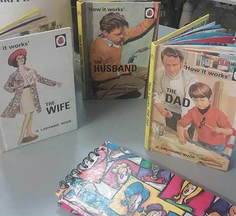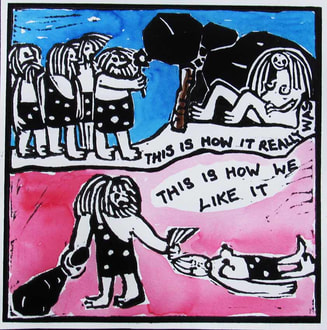
We need more women in positions of power everywhere, writes Cr Michael Whelan, starting with our own council.
By Cr Michael Whelan
AS WE continue to reel from the tragic murder of a young local woman we must think deeply on the continuing scourge of violence against women. If violence is condoned in one place it’s just a small step to another. A coward’s punch in a football match, delivered by a physically mature man on an 18-year-old boy, earns a three-game suspension. Is this serious treatment of violence? When we use terms like “Got him a beauty!” what judgement does that convey?
AS WE continue to reel from the tragic murder of a young local woman we must think deeply on the continuing scourge of violence against women. If violence is condoned in one place it’s just a small step to another. A coward’s punch in a football match, delivered by a physically mature man on an 18-year-old boy, earns a three-game suspension. Is this serious treatment of violence? When we use terms like “Got him a beauty!” what judgement does that convey?

As a man I must consider how I contribute to this community situation. I realise that my language is one way, and it too often gives an impression of aggression. I’ve started to check myself before, for example, abusing another driver who’s done something that annoys me.
Small beer but some months ago I was given a sticker that states: “Make the Link, Rigid gender roles support men’s violence against women.” The message is that bias and power are inculcated into our daily lives and we need to weed them out.
During a White Ribbon discussion recently the question was asked: “Is it OK to approach a woman you don’t know and comment on her appearance?” One perspective was that telling her she looked good was OK. The telling comment came from a woman who said: “Ask the women here what they think.” That, I believe, is the nub of it – it’s not OK to impose our male view on what is OK or not OK when it comes to our interaction with women.
From a governance perspective, the policy settings that support the status quo in our society, and under which men’s violence against women persists, have been determined by parliaments largely comprised of men.
In Bass Coast we have only two women out of nine councillors. It’s telling that both have been fine leaders in the mayor’s role and they make a contribution beyond their number. But further, we have no direct representation of minority groups.
We must address this bias toward older male representation. That means challenging the policy settings that govern local government. Where is the representation of young people, indigenous people, people on wages or young mothers? Simply if you are building a career or supporting a family on your own, you cannot afford to be on council. That’s why it tends to be dominated by semi-retired or self-employed older men.
During the last council election campaign there were damaging stories put out about one single woman candidate. While I challenged this at the declaration of the poll, it wasn’t dealt with. It has to be called out in future and it must cease.
Bad behaviour is endemic in politics. Emma Hussar has been the victim of the malicious leaking of some lurid allegations. It doesn’t matter whether those allegations are true; what matters is that our society allows such things to be weaponised, and mainly against women.
During a very good interview on ABC’s 7.30, Leigh Sales asked Ms Hussar what she thought her experience represented for other young women who may consider a career in politics. Her eyes said it all. She has risen from a background of suffering family violence and I suspect she will rise above the rubbish that our society encourages.
Julia Gillard endured a range of misogynist jibes during her time as Prime Minister. There was gratuitous comment on her life choices, jibes about being barren. Her partner was persecuted for a silly joke. These attacks will only stop if men and women from both sides of politics stand up against them.
Several women have exposed the bullying and threats that were used to garner numbers during the toppling of Malcolm Turnbull. Liberal MP Julia Banks, announcing that she would not recontest the seat of Chisholm, said, “The scourge of cultural and gender bias, bullying and intimidation against women continues in politics, the media and across business”.
Former Senator Judith Troeth lamented that the bullying could cause women not to seek to govern. “Politics is brutal at every level, but bullying and intimidation should not be present in any workplace.”
The blokes saw it differently. “This is politics,” said Victorian Liberal president Michael Kroger. “People speak strongly. People raise their voices. Well, so they should if great matters of state are at play.”
The problem is that our everyday behaviour informs our particular behaviour. If it is OK for our top lawmakers to bully people at work why is it not OK to take that behaviour home. Bullying is about control and the exercise of power over someone else – so is rape.
I've just read Jane Caro’s book Destroying the Joint: Why Women have to Change the World. It is insightful to a man to see the issue through the eyes of these women. I was particularly impressed by the piece from Stella Young, The Politics of Exclusion, where she revealed that exclusion could be even harsher when you are a part of an even smaller sub group, that is, women with a disability.
Well-meaning government is not enough. If you don’t understand the challenges another person faces, how can you make decisions on their behalf? And how can you understand? That only occurs when they are present in the room, when they can speak for themselves.
We're in the mess we're in with family violence because of the policy settings of governments determined by men over the ages when “great matters of state are at play”. If we don’t change the composition of our governing bodies we won't address the malignant problems that persist in our society.
Small beer but some months ago I was given a sticker that states: “Make the Link, Rigid gender roles support men’s violence against women.” The message is that bias and power are inculcated into our daily lives and we need to weed them out.
During a White Ribbon discussion recently the question was asked: “Is it OK to approach a woman you don’t know and comment on her appearance?” One perspective was that telling her she looked good was OK. The telling comment came from a woman who said: “Ask the women here what they think.” That, I believe, is the nub of it – it’s not OK to impose our male view on what is OK or not OK when it comes to our interaction with women.
From a governance perspective, the policy settings that support the status quo in our society, and under which men’s violence against women persists, have been determined by parliaments largely comprised of men.
In Bass Coast we have only two women out of nine councillors. It’s telling that both have been fine leaders in the mayor’s role and they make a contribution beyond their number. But further, we have no direct representation of minority groups.
We must address this bias toward older male representation. That means challenging the policy settings that govern local government. Where is the representation of young people, indigenous people, people on wages or young mothers? Simply if you are building a career or supporting a family on your own, you cannot afford to be on council. That’s why it tends to be dominated by semi-retired or self-employed older men.
During the last council election campaign there were damaging stories put out about one single woman candidate. While I challenged this at the declaration of the poll, it wasn’t dealt with. It has to be called out in future and it must cease.
Bad behaviour is endemic in politics. Emma Hussar has been the victim of the malicious leaking of some lurid allegations. It doesn’t matter whether those allegations are true; what matters is that our society allows such things to be weaponised, and mainly against women.
During a very good interview on ABC’s 7.30, Leigh Sales asked Ms Hussar what she thought her experience represented for other young women who may consider a career in politics. Her eyes said it all. She has risen from a background of suffering family violence and I suspect she will rise above the rubbish that our society encourages.
Julia Gillard endured a range of misogynist jibes during her time as Prime Minister. There was gratuitous comment on her life choices, jibes about being barren. Her partner was persecuted for a silly joke. These attacks will only stop if men and women from both sides of politics stand up against them.
Several women have exposed the bullying and threats that were used to garner numbers during the toppling of Malcolm Turnbull. Liberal MP Julia Banks, announcing that she would not recontest the seat of Chisholm, said, “The scourge of cultural and gender bias, bullying and intimidation against women continues in politics, the media and across business”.
Former Senator Judith Troeth lamented that the bullying could cause women not to seek to govern. “Politics is brutal at every level, but bullying and intimidation should not be present in any workplace.”
The blokes saw it differently. “This is politics,” said Victorian Liberal president Michael Kroger. “People speak strongly. People raise their voices. Well, so they should if great matters of state are at play.”
The problem is that our everyday behaviour informs our particular behaviour. If it is OK for our top lawmakers to bully people at work why is it not OK to take that behaviour home. Bullying is about control and the exercise of power over someone else – so is rape.
I've just read Jane Caro’s book Destroying the Joint: Why Women have to Change the World. It is insightful to a man to see the issue through the eyes of these women. I was particularly impressed by the piece from Stella Young, The Politics of Exclusion, where she revealed that exclusion could be even harsher when you are a part of an even smaller sub group, that is, women with a disability.
Well-meaning government is not enough. If you don’t understand the challenges another person faces, how can you make decisions on their behalf? And how can you understand? That only occurs when they are present in the room, when they can speak for themselves.
We're in the mess we're in with family violence because of the policy settings of governments determined by men over the ages when “great matters of state are at play”. If we don’t change the composition of our governing bodies we won't address the malignant problems that persist in our society.
